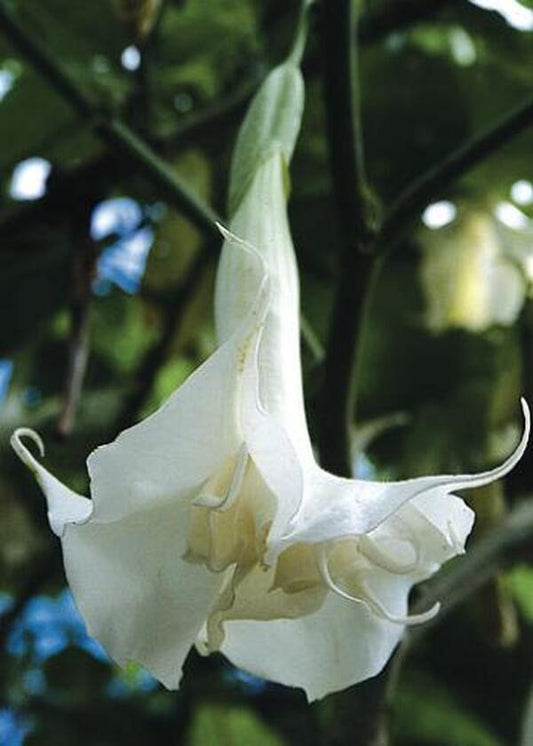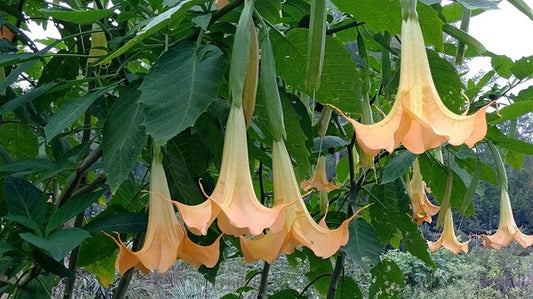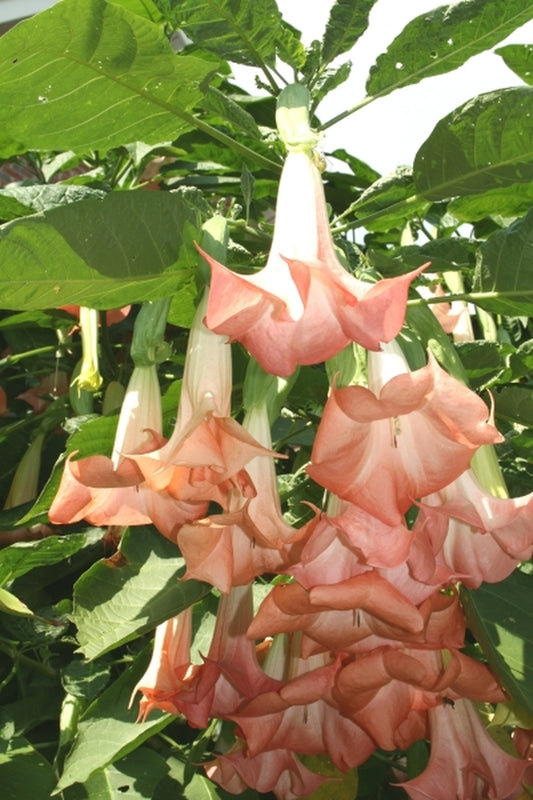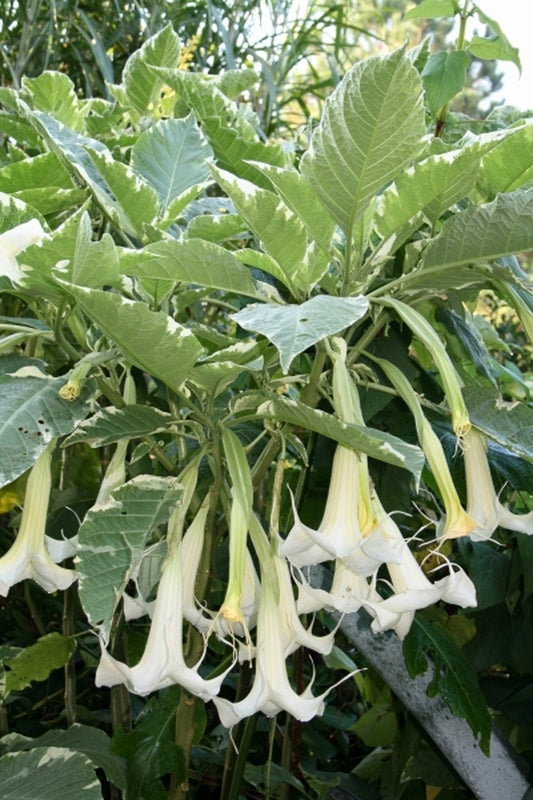Angel trumpets are tall, sun-loving perennials, sometimes topping 10' in height with a canopy nearly as wide. In late summer and into fall they are covered large numbers of huge, fragrant flowers.
These highly poisonous (just like the foliage of tomatoes) perennial members of the Solanaceae family from South America have long been prized for their huge, fragrant pendent flowers. They are often confused with members of the genus Datura, whose flowers are up-facing. We have found several hybrids that are winter-hardy perennials in our climate (when established, well-drained, and well-mulched). If you live further north, they make amazing tender perennial specimens in large containers. Containerized angel trumpets can be cut to the ground for winter, or if you are short on space, 1' long sections of the trunk can be saved in slightly moist peat moss for the upcoming season. Again, if you need a snack, do not munch on the foliage of your angel trumpets!
-
Brugmansia 'Betty Marshall'
Item #: 8581
Zones: 7b to 10b
Dormancy: Winter
Height: 120" tall
Culture: Sun
Origin: Hybrid
Pot Size: 2 qt. (1.9 L)
Regular price $30.00Regular priceUnit price per -
Brugmansia x candida 'Double White'
Item #: 5157
Zones: 7b to 10b
Dormancy: Winter
Height: 96" tall
Culture: Sun
Origin: Ecuador
Pot Size: 2 qt. (1.9 L)
Regular price $30.00Regular priceUnit price per -
Brugmansia 'Charles Grimaldi'
Item #: 5158
Zones: 7b to 10b
Dormancy: Winter
Height: 96" tall
Culture: Sun
Origin: Hybrid
Pot Size: 2 qt. (1.9 L)
Regular price $30.00Regular priceUnit price per -
Brugmansia 'Cherub'
Item #: 8163
Zones: 7b to 10b
Dormancy: Winter
Height: 84" tall
Culture: Sun
Origin: Hybrid
Pot Size: 2 qt. (1.9 L)
Regular price $34.00Regular priceUnit price per -
Brugmansia 'Snowbank'
Item #: 5088
Zones: 7b to 10b
Dormancy: Winter
Height: 60" tall
Culture: Sun to Part Sun
Origin: Hybrid
Pot Size: 2 qt. (1.9 L)
Regular price $34.00Regular priceUnit price per -
Brugmansia 'Sunset'
Item #: 4199
Zones: 7b to 10b
Dormancy: Winter
Height: 60" tall
Culture: Sun to Part Sun
Origin: Hybrid
Pot Size: 2 qt. (1.9 L)
Regular price $30.00Regular priceUnit price per
More Information About Brugmansia
The genus Brugmansia (Angel Trumpet) is a perennial member of the Solanaceae family (like tobacco and tomato) from South America that has long been prized for its huge, fragrant, pendent flowers.
When people see their first angel trumpet in flower, they are awed by the giant 10-inch-long exotic flowers and powerful nocturnal lemon scent. Most angel trumpet plants feature pastel-colored flowers of white, orange, yellow, or pink. If the giant flowers are not enough to tempt you, then some Angel Trumpets also have variegated leaves.
Like all members of the Solanaceae family, the sap, leaves, flowers and seeds of brugmansia are highly poisonous which makes the plants deer resistant. You too should handle Brugmansia with care... avoid contact with the sap, wear protective clothing, wash after touching, etc., as the chief toxic compounds are strychnine, atropine, and scopolamine, all of which can kill.
We have found several angel trumpet hybrids that are winter-hardy in our USDA Zone 7b climate (if well-drained and well-mulched). If you buy brugmansias, do so early in the year so that the plants are well-established by the time the first frosts arrive. If you live further north, angel trumpet plants make amazing tender perennial specimens in large containers. A containerized brugmansia plant can be cut to the ground for winter or, if you are short on space, 1' long sections of the trunk can be saved in slightly moist peat moss for the upcoming season.
How to Grow Angel Trumpets
Angel trumpets are tall, sun-loving perennials (small trees actually), sometimes topping 10' in height with a canopy nearly as wide. Keep your brugmansia well watered and you will be rewarded with large numbers of flowers in late summer and fall. Although most brugmansia plants are not equally winter hardy down to 0 degrees F, they also make great container tender specimen plants for the summer patio anywhere.
Brugmansia Plant Care Tips
Light
Brugmansia loves the light. Full sun is necessary to maximize Angel Trumpet flower production.
When to plant
If you are growing brugmansia in the ground, then plant after the temps warm up into the 70s F (20s C) but before mid-summer so that the roots can be well established before the first cold season.
Soil & Fertilizer
Brugmansia is not too picky as long as the soil should is well-drained, especially in winter when root rot is possible. If planting in a container, avoid letting the pot sit in standing water. Angel Trumpet flowers best with plenty of fertilizer given regularly during the spring and summer.
Watering
Angel Trumpets are thirsty and require ample water during the growing season. They love warm climates but bloom the best when they are kept well watered. If you notice the larger leaves drooping, then your plant is not getting enough water.
Container Planting
Angel Trumpet looks great in a large container provided you can water it enough when it is big. Even in a large container, you may have to water it twice a day from July to October. In the ground, Angel Trumpet roots can explore a larger volume of soil and thus have a larger pool of water to draw from and thus tends to be less stressed, which leads to more flowers.
Overwintering
In temperate areas, container grown Angel Trumpets need to be moved to a cool dark room for the winter. They will defoliate and should be kept just barely moist...watch out for root rot though. Garden specimens can be given a winter covering of mulch to insulate the roots but they plants should not be touched until spring when the first hints of growth occur.
Pruning
The previous years growth will die back to the ground in temperate climates. These trunks and branches should be left in place until spring when you see new growth occurring. Then you can cut back the old and make the plant look nice.
Toxicity
Angel Trumpet is deadly poisonous to people and pets if ingested. Never eat it or make a tea from it. The sap can also cause skin rash in sensitive people. When handling the plant, take precautions and wear long sleeves, gloves, and eye protection. Do not touch anything (eyes, mouth, etc.) until after washing your hands.







